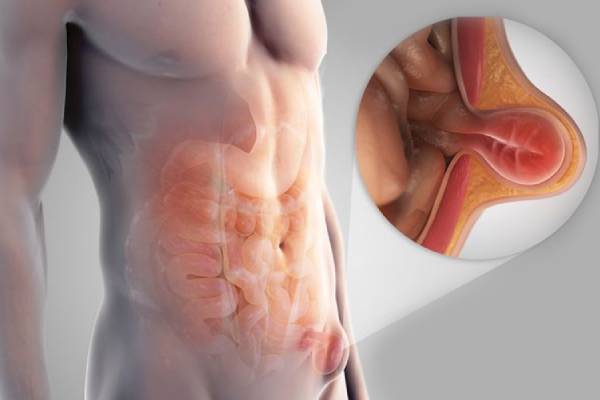Inguinal Hernia Treatment in Thrissur.
- Home
- Inguinal Hernia

Are you looking for a trustworthy Inguinal hernia surgeon in Thrissur who can give you the very best treatment possible? Dr. Arun S. Nair is a highly experienced Gastroenterologist in Thrissur, Kerala, and a Hernia specialist in Thrissur. Dr. Arun Nair also specializes in hernia repair surgery. Also, he is a hernia repair specialist who has completed 10000+ hernia repair operations using laparoscopy, the most favored and modern surgical technology.
Dr. Arun Nair, a seasoned healthcare professional in Thrissur, blends traditional and modern treatment modalities. The approach typically involves surgical intervention to mend the weakened abdominal wall, preventing complications. Procedures like open hernia repair or minimally invasive techniques such as laparoscopic surgery are employed, ensuring a personalized approach based on each patient’s needs.
What is Inguinal Hernia?
An inguinal hernia happens when a part of the intestine or other tissues pokes through a weak spot or tear in the abdominal muscles. Picture it like a small “bump” that can appear in the groin area. This kind of hernia occurs in the inguinal canal, a sort of pathway in the lower abdomen.
Think of the inguinal canal as a natural opening in the belly wall. Inguinal hernias are more common in males than females and can occur at any age, although they are most commonly seen in adults. According to Dr. Arun Nair, a well-known Hernia surgeon In Thrissur, an inguinal hernia develops when natural weakness in the abdominal wall, increased pressure in the abdomen, and straining during physical activity, lifting heavy objects, or bowel movements.
What are the causes of Inguinal Hernia?
As per Dr. Arun Nair, a distinguished expert in inguinal hernias based in Thrissur,
Let’s explore some key causes:
- Weak Abdominal Muscles: Imagine your abdominal muscles like a superhero’s shield.
- Pressure Inside Your Belly: Think of your belly as a balloon that can get squeezed. Stuff like constant coughing, being a bit too round, battling constipation, or lifting heavy things can add pressure, nudging a hernia to make an appearance.
- Family History Matters: Picture your family tree as a treasure map. If there’s a history of hernias marked on that map, you might have a higher chance of joining the adventure.
- Men vs. Women: Now, the inguinal canal is like a secret passage. Men have it, making them more likely to get hernias. Plus, the risk grows as we celebrate more birthdays.
- Pregnancy’s Impact: For women, pregnancy is like a grand event. But all the excitement, pressure, and stretching during this time can create the perfect setting for a hernia to make its debut.
What are the Signs & Symptoms of inguinal Hernias?
Inguinal hernias can show up in different ways, but here are some common signs to look out for:
- Spot the Bulge: Keep an eye out for a noticeable bulge in your groin or scrotum, especially when you’re up and about or doing things like coughing or straining. For women, you might notice it around the pubic bone.
- Pain or Discomfort: If you’re lifting heavy stuff, coughing, or bending over and you feel pain or discomfort in that area, it could be a sign of an inguinal hernia.
- Achy or Burny Feeling: Some folks mention feeling an ache or burning around the bulging area. It’s like a signal that something might be going on.
- Groin Gets Heavy: Picture your groin feeling a bit heavier or under pressure. That sensation might be telling you something is going on with an inguinal hernia.
How Inguinal Hernia is Diagnosed?
When it’s time to figure out if you have an inguinal hernia, Dr. Arun Nair takes a thorough and friendly approach. Let’s break down how Dr. Nair typically goes about it:
- Talk about Your Health Story: Dr Arun Nair kicks off the diagnostic adventure by chatting with you about how you’re feeling and your health history. You’ll discuss any pain or discomfort you’re dealing with, what makes it better or worse, and any surgeries you’ve had in the past.
- Snapshots of the Inside: In some cases, Dr. Arun Nair might suggest taking special pictures to get a closer look. It’s like using a camera but for your insides! Common tools include ultrasound and, sometimes, CT scans. These pictures help Dr. Nair see what’s going on in your belly and understand the size and spot of the hernia.
- Special X-ray Adventure – Herniography: For an even closer look, Dr. Arun Nair might choose a special X-ray adventure called herniography. It’s like sending a little explorer (contrast material) into the hernia area and then taking X-rays to see what it discovers.
Treatment of Inguinal Hernia:
If you have an inguinal hernia, you might need to think about surgery.
Let’s look at the two main ways to deal with it
- Hernia Repair Surgery: When it comes to inguinal hernias, surgery is often the way to fix things. In this surgery, the bulging part is gently put back in place, and the weak belly wall gets some extra help, usually with stitches or a special mesh. The surgery can happen in the usual way with a cut or using modern methods like small cuts (laparoscopic) or even with robots
- Watchful Waiting (Observation): Sometimes, especially if the hernia is small and not causing much trouble, your doctor might say, “Let’s wait and see.” This means keeping an eye on the hernia over time without rushing into surgery. But if things start getting bigger or more uncomfortable, surgery might be the way to go.
Complication if Untreated:
- Trapped Tissue (Incarceration): Imagine a part of your intestine or belly tissue getting stuck in the hernia sac. This can lead to swelling, pain, and even blockage of the bowel.
- Blood Supply Cut Off (Strangulation): Strangulation is like a major alarm. It happens when the blood supply to the trapped tissue in the hernia sac is stopped.
- Blocked Intestine (Obstruction): If a piece of the intestine gets stuck in the hernia and causes a blockage, it leads to intense belly pain, nausea, vomiting, and trouble passing stool or gas. It’s a serious complication that requires urgent medical attention.
- Swelling in the Scrotum (Hydrocele): For guys, untreated inguinal hernias can sometimes make fluid build up in the scrotum, causing swelling called a hydrocele.
Why Choose Dr. Arun S Nair for Hernia Treatment in Thrissur?
- Expertise and Experience: Dr. Arun S. Nair is a highly experienced Gastroenterologist in Thrissur, Kerala, and a hernia specialist in Thrissur. Dr. Arun Nair also specializes in hernia repair surgery. Also, he is a hernia repair specialist who has completed 10000+ hernia repair operations using laparoscopy, the most favored and modern surgical technology.
- Comprehensive Approach : Dr. Nair adopts a comprehensive approach to hernia treatment, considering each patient’s unique medical history, symptoms, and lifestyle. His personalized care ensures that the treatment plan is tailored to individual needs.
- Advanced Treatment Options : As a seasoned healthcare professional, Dr. Arun Nair is well-versed in the latest advancements in hernia treatment. He offers a range of treatment options, including both traditional and minimally invasive surgical techniques, ensuring that patients receive state-of-the-art care.
- Patient-Centric Care : Dr. Arun S Nair prioritizes patient well-being and satisfaction. His patient-centric approach involves clear communication, addressing concerns, and involving patients in their treatment decisions, fostering a supportive and collaborative healthcare environment.
- State-of-the-Art Facilities: Dr. Arun Nair practices in well-equipped medical facilities that meet high standards. Patients can expect access to modern technology and a comfortable environment for their hernia treatment.
- Positive Patient Feedback: Positive feedback and testimonials from previous patients highlight Dr. Nair’s commitment to delivering exceptional care. The trust and satisfaction expressed by those who have undergone hernia treatment with him are indicative of his dedication to patient outcomes.
- Local Accessibility : Located in Thrissur, Dr. Arun S Nair’s practice offers local accessibility, making it convenient for individuals seeking hernia treatment in the region.
- Clinic Location: 1ST FLOOR, ZABS FORT, Civil Lines Rd, P.O, West Fort, Poothole, Thrissur, Kerala 680004
Frequently Asking Questions ( FAQ's):
Living with an inguinal hernia is generally safe, but it won’t improve on its own and can lead to complications over time. Consulting a healthcare professional is crucial for assessment, and surgery may be recommended for pain or growth, ensuring long-term well-being with regular check-ups.
The danger of an inguinal hernia lies in the risk of complications, including tissue trapping, blood supply cut-off, bowel obstruction, and chronic pain.
Inguinal hernia surgery is generally considered safe, but like any surgical procedure, it carries some risks. The specific safety and risk factors depend on individual circumstances, and it is best to discuss them with a healthcare professional.
Surgical repair is the most common and effective treatment for inguinal hernias, providing a long-term and often permanent solution to the condition.
Possible complications of hernia repair surgery include infection, bleeding, recurrence of the hernia, pain or discomfort, injury to nearby structures, and reactions to anesthesia.

